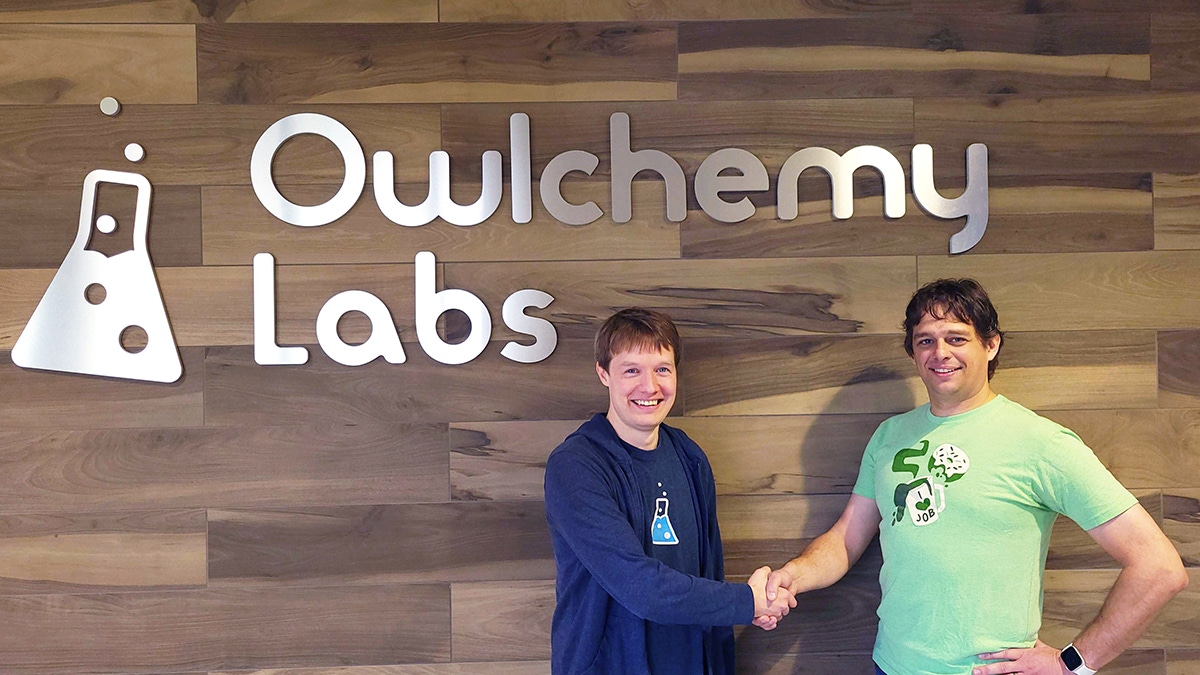Owlchemy Labs execs: Hand tracking is next major leap for VR
Hand-tracking and strong sales numbers might be the foundation for VR growth, according to Owlchemy Labs' Devin Reimer and Andrew Eiche.

With the PlayStation VR 2 out on the market, and Meta's Quest headset picking up more and more steam in driving sales for virtual reality game developers, the VR market is definitely starting to feel a bit more robust than in the uncertain days of 2016-2018.
One company that survived that wave of initial VR enthusiasm was Google-owned developer Owlchemy Labs—the makers of Job Simulator and Vacation Simulator. It's a studio that's grown from a dozen employees to now around 55, and has kept its head above water even while the tide of the VR market has ebbed and flowed.
At DICE 2023, Owlchemy Labs execs Andrew Eiche and Devin Reimer (who just executed a role shuffle that will see Eiche step in as CEO and Reimer taking a break from the video game industry), linked up with Game Developer for a quick chat about what's next in VR—not just for Owlchemy Labs, but also the entire industry.
What's got them excited? It's all about the hands.
Hand-tracking might be the next big jump for VR headsets
Reimer explained to Game Developer that Owlchemy Labs has been experimenting with hand-tracking technology "for about two years now," and that even experimental efforts have shown major results.
He explained that when showing virtual reality projects to his wife (who doesn't work in games and is less familiar with controller standards), she's way more excited when she gets to use hand controls. Owlchemy cut its teeth on making games that take advantage of natural human gestures, like picking up a phone or flipping hamburgers. To make games that appeal to more everyday users, using better and better hand controls make it all "so much more intuitive."
Eiche added that the Owlchemy team has had to grapple with the fact that unsophisticated hand controls have meant the team's need to tweak the design of objects in Job Simulator. There's no paper in Job Simulator games because paper is thin and needs fine motor control to interact with. Popcorn in Vacation Simulator can't be rendered at actual size because it would also be hard to interact with.

He compared the current state of VR controls with that of the Blackberry and Palm Pilot devices back in the late '90s and 2000s. Those devices relied on confusing interfaces that sometimes weren't intuitive (anyone remember the weird pseudo-language you needed to write in Palm Pilots? wild times). "That was never going to work [in the long run] because no one wants to learn 'special English' for that weird device."
That led Reimer to point out that other major hand tracking applications on products like Microsoft HoloLens also don't seem like the way of the future. The weird gestures used to control that augmented reality headset aren't natural, and he claimed that "it's not going to fly either."
And for developers making VR games, good hand tools will probably be beneficial too. If all you need is your hands to start playing, it's less of a pain to throw a headset on and start experimenting, Eiche noted.
For hand controls to work with VR headsets, the pair explained that better camera technology on headsets will likely be what makes it possible (they praised Meta's efforts as the one's currently bearing the most fruit).
The VR market is stabilizing (for some game-makers)
"VR is definitely here to stay," Reimer told us with excitement. "There's no way that it's going away now."
Reimer felt strongly about this reality because Owlchemy Labs and other VR studios are now able to fully sustain themselves through software sales. In the field's early days, companies were sustained either by investment capital or funding from platforms in need of content.
Eiche made the point that the launch of the PSVR2 feels very different than the launch of the original Oculus Quest, or even the first PSVR headset. When Job Simulator first launched, it was only one of maybe 4-7 titles on platforms like the HTC Vive or Oculus Quest. The PSVR2 launched with over 50 game titles.
Games like Among Us VR are able to sell a million units within a year of launch, and Bonelab made $1 million within its first hour of release last year. Reimer doesn't see that just as a successful business metric, but also an indicator that these developers will have the resources to improve their tech stacks and of course, make better games.
Update: This story previously stated that both Reimer and Eiche were co-founders of Owlchemy Labs. Reimer was one of the studio's co-founders. We've updated this piece accordingly.
Read more about:
FeaturesAbout the Author(s)
You May Also Like







.jpeg?width=700&auto=webp&quality=80&disable=upscale)








